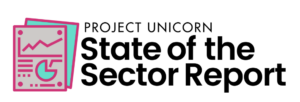Project Unicorn Releases New K12 Data Interoperability Report: What it Means for Classroom Educators
Key Points
-
Interoperability can make it easier for educators to view information from multiple source systems—such as student grades, standardized test scores, attendance, discipline/behavior history, and IEP information—in a single dashboard.
-
Project Unicorn has released their State of the Sector report – the first of its kind analysis of K12 school system capabilities and infrastructure for leveraging education data.

By: Erin Mote
Data interoperability, defined as the seamless, secure, and controlled exchange of data between applications, isn’t something educators think about on a day-to-day basis as they manage a classroom, interact with students, and exchange emails with parents. The technical underpinnings that make interoperability work are often invisible to the user. Like electricity, plumbing, or the highways we drive, it’s not particularly “sexy.” Even though most educators can recite chapter and verse the challenges caused by the lack of data interoperability, including the endless nights creating spreadsheets or the entry of grades into three different systems, they may not recognize interoperability as the solution. It’s kind of like broadband internet access: you don’t know what you’ve been missing until you have it, but once you’ve had it, it’s hard to live without.
Interoperability can make it easier for educators to view information from multiple source systems—such as student grades, standardized test scores, attendance, discipline/behavior history, and IEP information—in a single dashboard. Interoperability creates efficiencies and reduces complexities and costs while also allowing users to toggle from an individual student record to a whole class. This way, they can view individual data points as part of a larger context and identify trends or patterns that help them better support students. The alternative to a single visualization might be logging into five different systems, downloading data into spreadsheets, and manually manipulating the data to view it in one place. Interoperability empowers educators to look at the whole student picture, not just a tiny piece of it.
Interoperability creates efficiencies and reduces complexities and cost while also allowing users to toggle from an individual student record to a whole class.
Erin Mote
Despite the many benefits of data interoperability, until now there has been no way to holistically understand the state of data interoperability in K12 and identify ways to build school system implementation capacity. To help evaluate how districts are leveraging interoperable data systems, Project Unicorn has released their State of the Sector report – the first of its kind analysis of K12 school system capabilities and infrastructure for leveraging education data. Based on results from the School System Data Survey (SSDS), launched in spring 2021, the report features data from over 100 Local Education Agencies (LEAs) and regional Education Service Agencies. The report represents an unprecedented collaboration with a coalition of 16 education organizations working to address the challenge of data interoperability in K12 education.
Key report takeaways for educators:
- Many district leaders are not familiar with interoperability standards and/or how they might be used in their school system.
- Larger and more urban districts tended to score higher on the survey overall than smaller and more rural ones.
- School systems that have established procurement practices around technology tools are more mature in their use of interoperability standards and protecting student data privacy.
Classroom teachers should be spending their time leveraging data insights to benefit students instead of manually rostering classes into web-based tools, manipulating data in spreadsheets, and entering assessment results in multiple locations. Data interoperability has the potential to transform the daily life of educators, saving them time and effort and supporting the use of meaningful, data-informed instruction. Educators can play a powerful role in advocating for data interoperability within their districts. Check out Getting Smart and Project Unicorn’s Teacher Toolkit to get engaged. With the insights derived from the State of the Sector Report, the Project Unicorn coalition hopes to help make this transformation a reality.
More about data interoperability on Getting Smart can be found here in this smart bundle.
Erin Mote is the Executive Director of InnovateEDU and co-founder of Brooklyn Laboratory Charter Schools (LAB). She leads InnovateEDU and its major projects including the development of Cortex, work on data interoperability, an urban education Fellowship to diversify the teacher pipeline, and supports for LAB’s growth.






0 Comments
Leave a Comment
Your email address will not be published. All fields are required.